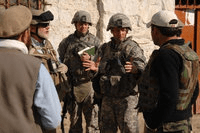U.S. Air Force Capt. Tyler Rennell and his Afghan student pilot had a communication problem. On a Nov. 2 training flight near Kandahar, Rennell was trying to teach Capt. Moeed, his Afghan air corps trainee, how to use a GPS device to navigate their Mi-17 helicopter. Moeed didn't seem to understand the device's terminology, and Rennell didn't know how to explain it to him.
Every word that Rennell and Moeed exchanged had to pass through a Pashto-speaking interpreter sitting in the back of the helicopter, listening in via the chopper's intercom. "Tell him," Rennell urged the interpreter, after describing the GPS functions for a second time. The interpreter seemed puzzled as he searched for Pashto words to match the English terms, and it took him several tries before Moeed seemed to understand Rennell's directions.
That minor communication problem over Kandahar last year was but one episode in a much broader crisis. More than eight years into the Afghan war, U.S. forces do not have enough interpreters -- or good enough interpreters -- speaking Pashto or the majority language of Dari. The shortages reflect a struggle within the U.S. government over what kinds of war-zone interpreters it needs, how to define standards for them, and how to find people to fill the ever-expanding number of needed positions.

